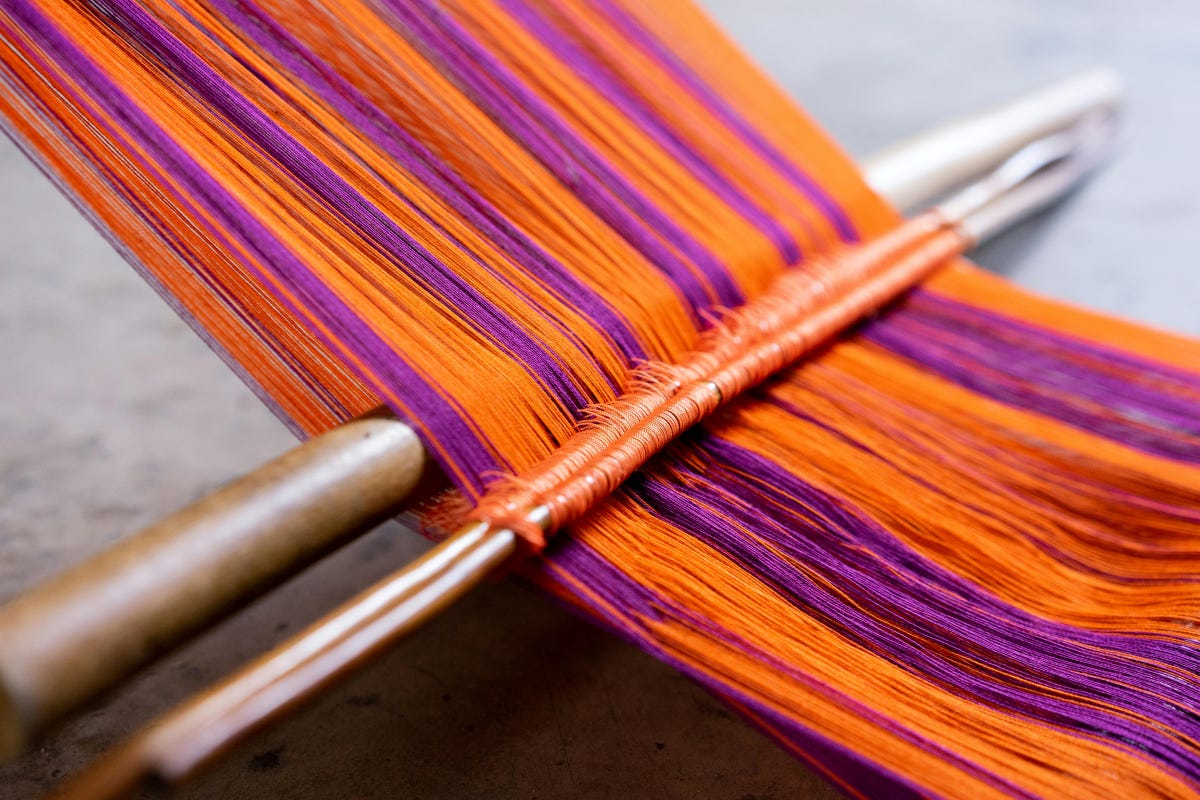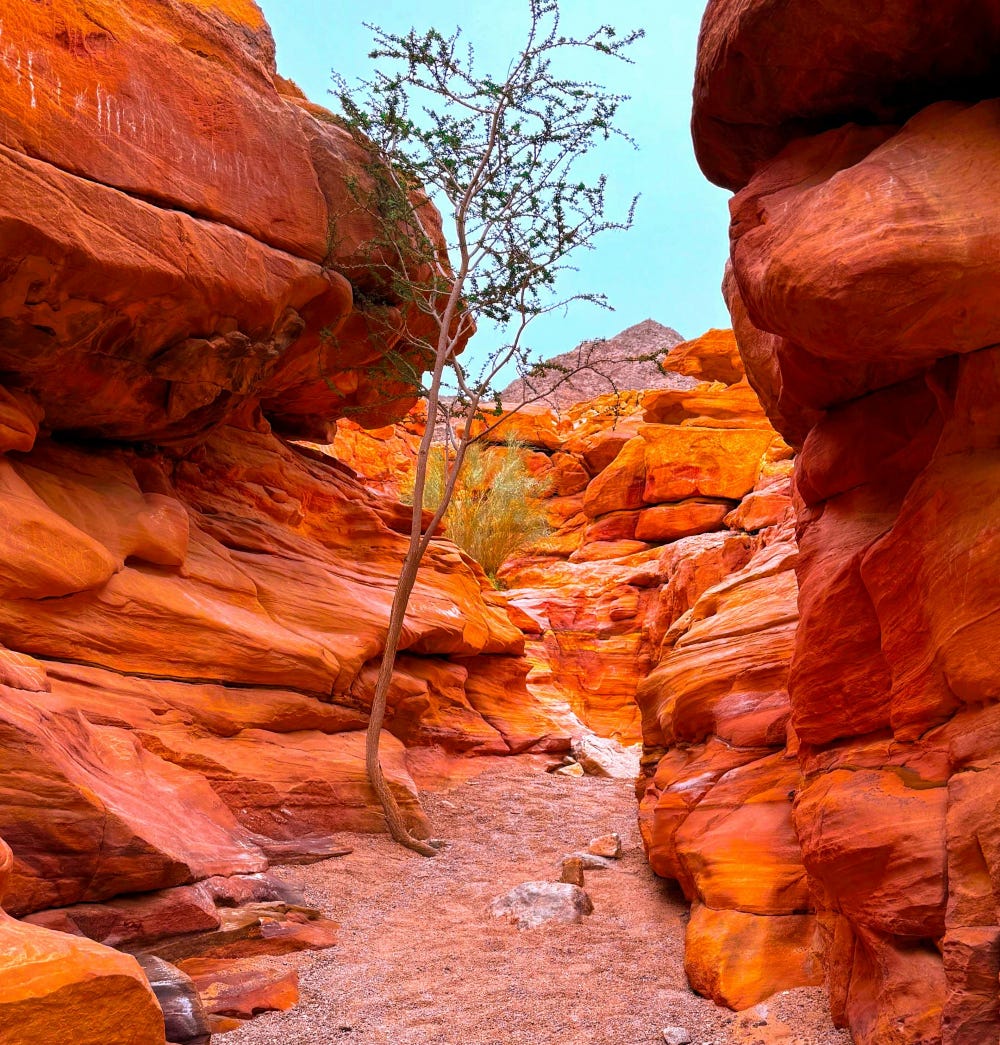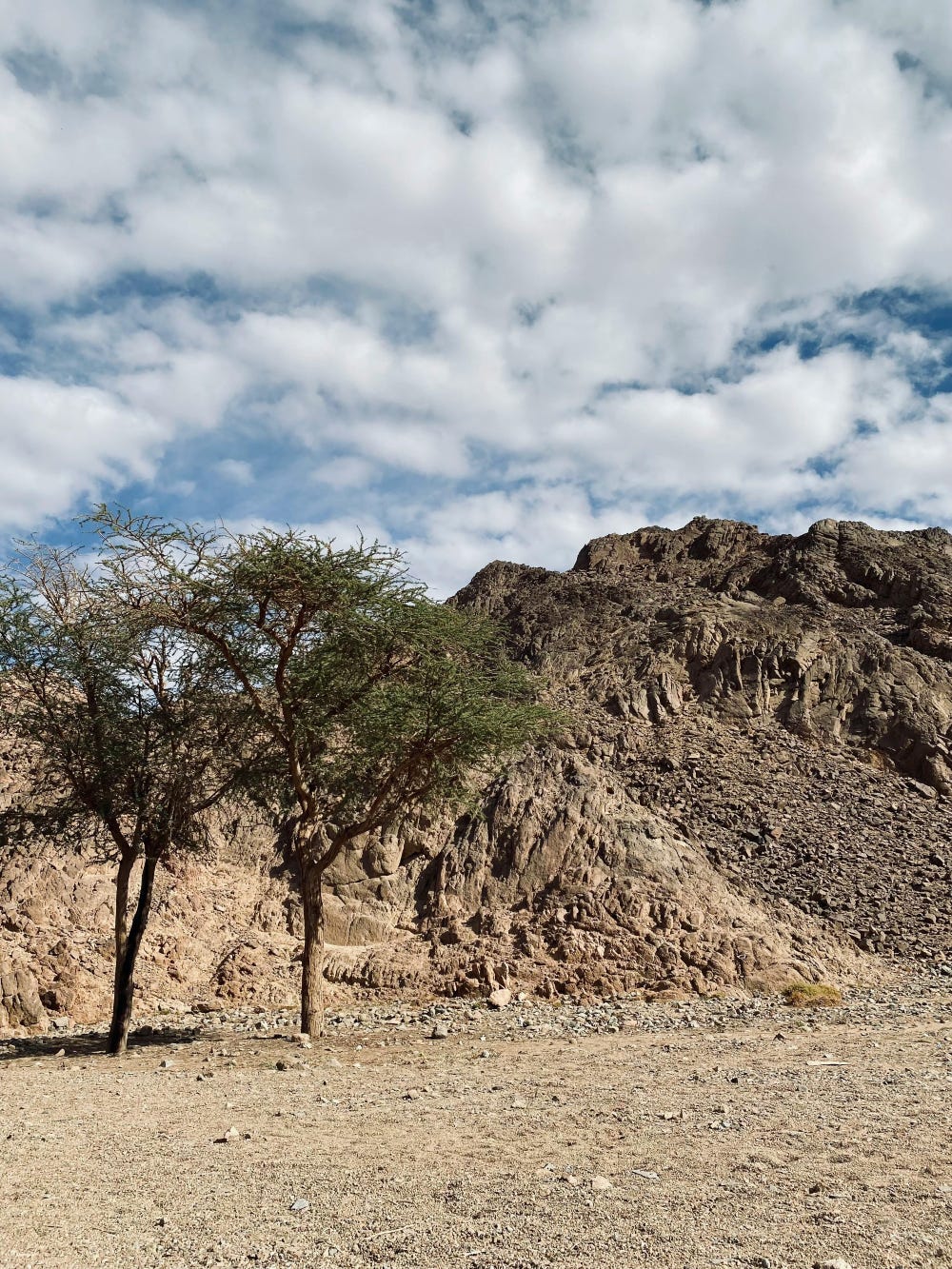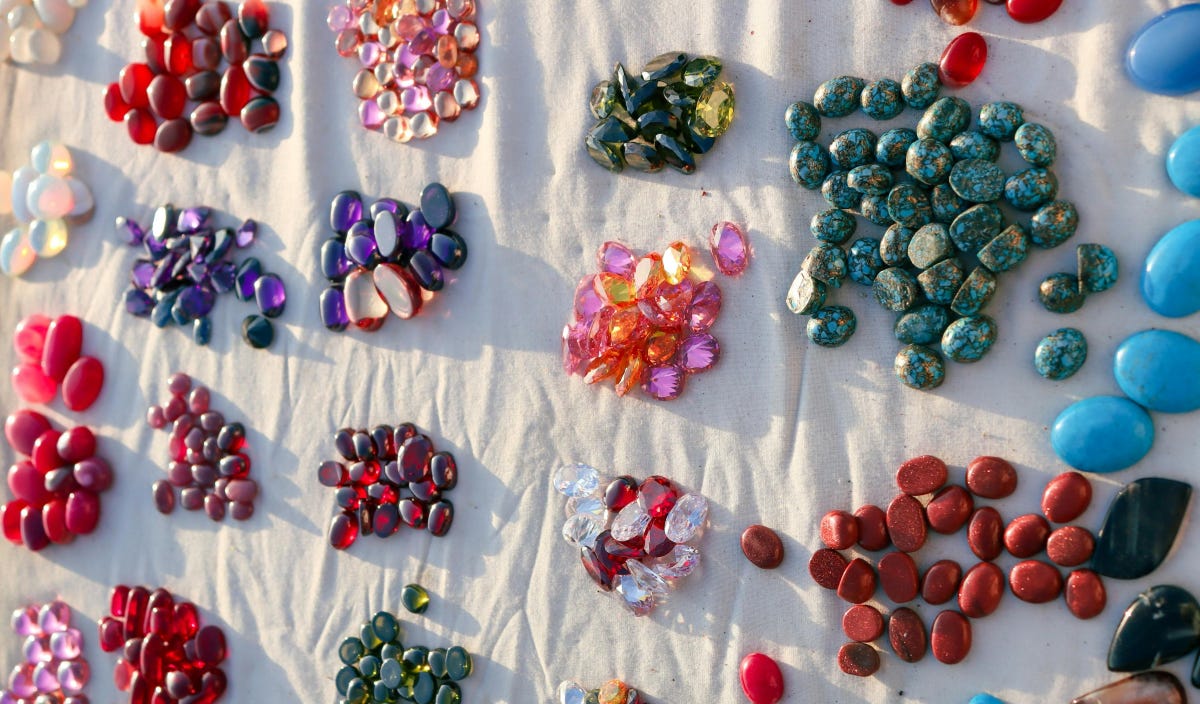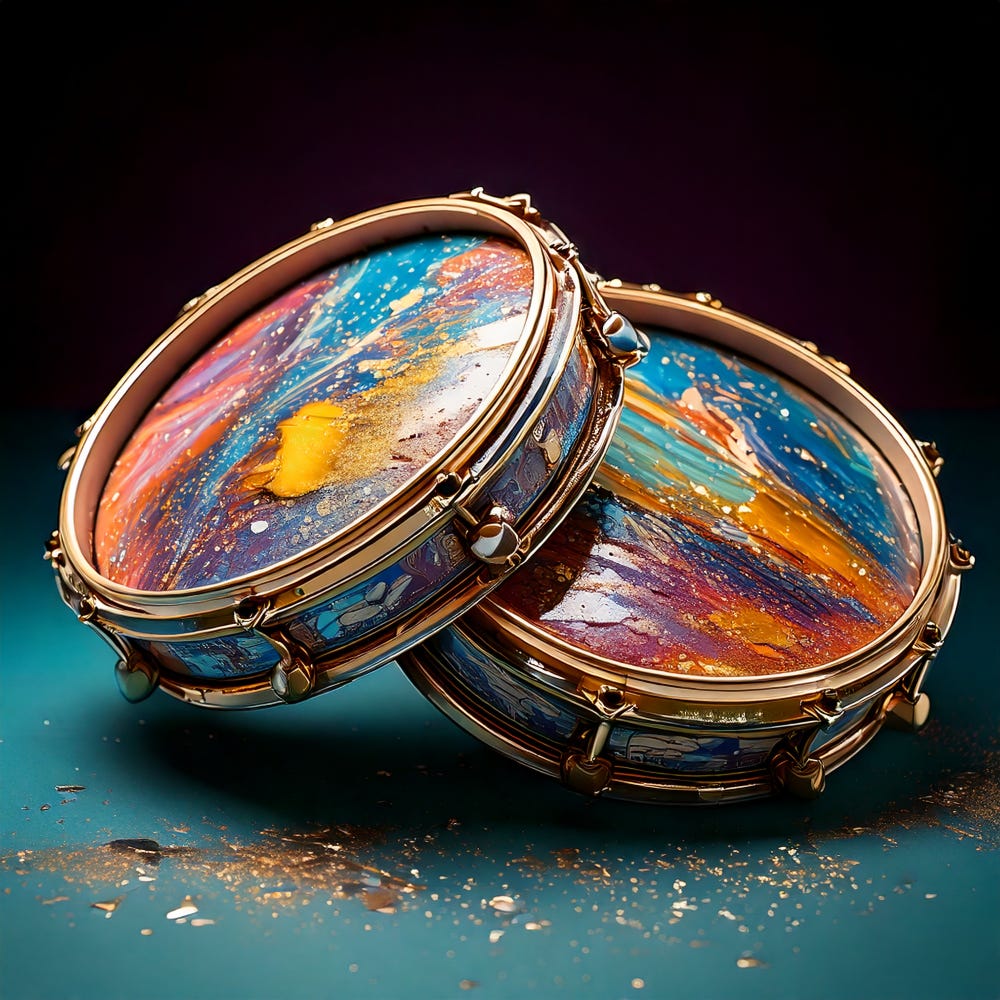Becoming Family
A story about building the Tent of Meeting in the desert. For children 9-14.
Sarah trudged along, kicking the desert sand. Her neck ached from balancing her pack on her head. Back in Egypt she had carried heavier loads. This sack was lighter, but it flopped onto her face.
She shoved it back, but it slid sideways. Pressing her lips together tightly—she WAS NOT going to complain to Imma—she grabbed it. I can balance a jug of water just fine, she thought. And sheaves of straw. They’re stiff, and they stay put. I love this yarn, but carrying it is a real pain!
Bending forward, she let the pack drop into her arms. She slung it over her shoulder, keeping tight hold of its knot. Now she’d have to walk with her arm up, holding the knot. Her arms got tired of that position.
Making it worse: she didn’t have any girlfriends to complain to. At least in Egypt she had her friends. Carrying straw and water, the two tasks that kept her busy every day, was boring, but she and the other girls chatted and joked as they worked. She was lonely now.
Sarah shifted the pack to her other shoulder and thought of the yarn inside. Their Egyptian neighbor, Meryptah, had spun it. The yarn was gorgeous: turquoise, a gorgeous red, bright orange, and purple. Meryptah spun and dyed the finest, most beautiful yarns Sarah had ever seen. Of course, she admitted to herself, she hadn’t seen much fine yarn, just the roughly spun and quickly woven fabrics that the slaves could afford.
Once she had watched Meryptah weave a picture with yarn. Meryptah had noticed, and called her over. She had shown Sarah how she made the picture. She even let Sarah put in a bit of turquoise yarn. Sarah said she hoped she would be able to learn to make pictures like that someday, but in her heart she had known she wouldn’t because slaves didn’t weave.
Then Pharoah had told the Israelites to leave.
The night before they left Egypt, Imma asked Meryptah for gifts that she could give to God. The Egyptian woman took a piece of strong cloth, piled it full of her beautiful yarn, and tied the corners together to make a sack. “Half of this is for Sarah. If you are ever free, maybe Sarah can learn to weave,” she said, handing the sack to Imma.
Imma took the sack and said thank you. But to Sarah she had said, “Half of this is for you, but you have to carry it. If you complain, you will leave it on the path.”
If this was freedom, Sarah didn’t like it. Scary things kept happening, too many to count. And then at Mt. Sinai, a huge, scary voice told them he was God, and He gave them a new bunch of rules.
Sarah chewed her lower lip. Now they were slaves of this scary God, and all this God seemed to want was for them to keep trudging through the endless desert.
Sarah had never felt so alone. Sure, she was with Imma, Abba, and her brother Yitzi. They were surrounded by all the other Israelites. Every day they walked in the same order, with the same people near them. None of the people nearby were friends. She didn’t even know where her friends were.
Mostly the crowd walked in silence. Imma and Abba didn’t speak much now, even in the evenings when they camped. They made Sarah and Yitzi stay very close. The crowd was so big that Imma was afraid they’d get lost. And Abba said it was possible her best friend wasn’t even here. Many of the Israelites stayed in Egypt. They thought Moshe was crazy. No one spoke to God except Father Abraham, and that was long, long ago—before the Israelites had even gone to Egypt!
Sarah followed the others, picking her way carefully through a rocky pass. The path curved going lower and lower. Then suddenly, not too far below, she saw a large plain. There were even some scrubby trees. People were setting up camp here. Maybe they would stay for awhile.
That evening there was a meeting for the men. After, Abba told Imma, Yitzi and Sarah about it. “Moshe appointed Betzalel ben Uri of the tribe of Judah, and Oholiab ben Ahisamach of the tribe of Dan to build a Tent of Meeting.”
“What’s that?” asked Yitzi.
Abba shrugged. “It’s some kind of a home for God. The Tablets that Moshe brought down from Mt. Sinai will go there, and other special things that we will use to worship God. Moshe said God told him to do it. I guess we’ll find out what it’s like.”
Imma pursed her lips and shook her head. “It’s being built by two men from different tribes? They’ll spend all their time arguing! And what about our tribe? It will belong to those two tribes, and we will be out. I don’t like this idea at all.”
“There’s more. Moses asked us to give him any jewelry, gems, or other things that they can use to make it beautiful,” said Abba. “Did you get anything from our neighbors before we left?”
Imma dug around in her pack and pulled out a small bag. “One of the women nearby, I never knew her name, gave me this.” Spreading out her robe, she poured the contents of the bag onto her lap. Colorful stones sparkled in the firelight. “Maybe they can use these. I certainly don’t know what else they’re good for!”
Sarah sat on her bag of yarn and was silent, thinking of things to say if anyone suggested she give the beautiful yarn away. It was for after they found a new home and she grew up. It wasn’t for any weird Tent of Meeting that wouldn’t even belong to their tribe.
Over the next weeks, many of the Israelites helped work on the Tent. Sarah took half of the yarn out of the sack and wrapped the rest back up to save for her future. Imma brought Sarah when she went with other women to give the yarn and sparkly gems to Oholiab. The woman who camped nearest to them carried a sack of gold jewelry. She showed some of the pieces to Imma. “Can you imagine wearing these?” she asked. “I can’t! I’m glad to give it to this Tent. I will know that I’ve helped build it.”
Imma raised her eyebrows. She tipped her head forward. “I never thought of that,” she said slowly. “I didn’t know what to do with those gems, but I never thought that when they are used, I will also have a part in the Tent.”
On the way back, a group of women—some from other tribes—all chatted about the Tent. “Something for all of us,” one woman said. “We’ll be able to tell our grandchildren that we donated our best things for it.”
“We all have part of building it!” said another.
“It will belong to all of us!” said a third.
As the women strolled slowly back to their camps, Sarah and a group of girls her age started talking. Two girls were camped near Sarah’s family. By the time they got back to their camps, she knew they’d be friends.
Sarah took her sack and turned away from her family so she could look at it alone. Opening it, she stroked the gorgeous yarn. Meryptah had given it to her for her to use when she grew up. But what would she do with fine, fine yarn in these beautiful colors? She thought of the woman with the jewelry who couldn’t imagine wearing any of it.
Sarah bit her lip. Would she ever have a colorful picture hanging in her house? She couldn’t imagine that!
Maybe, though, Oholiab could use it for the Tent of Meeting. If he did, then every time she went into the Tent of Meeting, or one of the priests wore something woven from the yarn, she would know that her very own gift went into it. That would make it partly hers. It wouldn’t be like selling it or giving it to a stranger, or—horrible thought—leaving it on the side of the trail because she was too tired to carry it further.
She took the half-empty sack in her arms. “Imma,” she said, “Let’s go back and give Oholiab the rest of this yarn. I think it should belong to the Tent of Meeting too.”
“It’s for you when you grow up,” Imma said.
“I know. But if it is used for the Tent of Meeting, it will still be for me—for when I go into it, or see it, or even think about it. But it will be for everyone else, too.”
Later, Abba said, “I told Oholiab that my grandfather taught me to carve wood. He gave me a knife and a scrap of wood, and I carved a bird. A crowd watched, so I explained what I was doing. Oholiab told me to teach carving. Betzalel will direct us, and then metalworkers can pound gold and silver over our carvings.”
Imma’s forehead wrinkled. “I am worried about strangers!”
“I don’t think anyone thought about tribes. I know I didn’t. Everyone just wants to help,” said Abba.
“Maybe tribes don’t matter here in the desert,” said Yitzi. “We all own almost nothing, and God is giving us food and taking care of us. Here, I think we’re all the same.”
Sarah nodded. “Tomorrow I’m taking my pack of yarn from Meryptah to Oholiab. I bet he will use it for something everyone, even God, will enjoy.”
She stood up and stretched. “It’s not like back in Egypt. Here, everyone is talking to everyone else. Everyone’s talking about what they donated and what they will donate. All the gifts the Egyptians gave us will go to God’s new home. We give gifts, and the Tent of Meeting is giving back.”
“What is that?” asked Imma.
“It is giving us oneness. God led us out of Egypt, small families and large tribes. But here, we all, together, will have one Tent of Meeting. We are becoming one big family. I dreamt of weaving, and a girl I met named Ruti, from the tribe of Issachar, dreamt of making new jewelry with the silver that their neighbors gave, and another girl, Bassi, gave a bag of fine, creamy linen yarn that she had wanted to knit into lace for a fine robe. But now we have a new dream: a dream of sharing all the beautiful things we have with everyone else to make a beautiful home for God. We are becoming one big family. At least, that’s how it feels to me.” Sarah straightened.
Imma nodded slowly. “What you are saying makes sense, Sarah. That woman who walks near us spoke to me today. She seems very nice. I don’t know why I was afraid to talk to her before. And I met other nice people. We too all wanted to help make this home for God. It will be something for all of us to share.”
Abba spoke at last. “Tonight, Moshe said that we are no longer Israelites, held together just because our tribes come from brothers. Now we are Jews, held together because we told God we would do what He says and listen to what is taught in His name.”
Sarah turned in a circle, hands outstretched. “We are Jews now. We are also the People of Israel. We come from Abraham, Isaac and Jacob, and we each have a tribe. But now we’re connected, like years ago, before the brothers became separate tribes. We are one big family, with one God and one Tent of Meeting.”
Imma pulled out tambourines. She and Sarah had used them when they danced in thanksgiving after the Red Sea had opened to let them escape the Egyptian army. Now she handed one to Sarah. Their neighbors heard them and came out. One asked what they were celebrating. When Imma repeated what Sarah had said, the neighbor women ran to their camps and brought back their tambourines, too. Soon the girls and women danced in a circle as the men and boys clapped and sang, “We are all family, we are one big family.” And Sarah danced most of all.
*Frocks in Stock is a website providing free Jewish photos and more, representing Torah-true Judaism. They are always looking for more photos that show Torah-true living, and also offer classes for graphic designers.
For Parents, Teachers and Others
This story is based on descriptions of the building of the Mishkan—the Tent of Meeting that was built in the desert, carried throughout the 40 years that the Jews wandered in the desert and was then set up more permanently once the Jews reached the Promised Land.
Not much is written about the role of children or the daily lives of the Jews during those desert years, except what is written in the biblical book of Exodus. The rabbi I consulted, Rabbi Yosef Erlich, told me that this gave my imagination a clean slate.
The Torah, known to Christians as the Old Testament, is the notes that Moses took while God gave him the Law. Like Spark Notes, the text is just the highlights designed to spark the memory of the note-taker. Judaism teaches that Moses spent the rest of the 40 years that the Jews were in the desert teaching God’s Law to the people. The words that were taught beyond what is written in the Torah are know as the Oral Law. They were codified in the early centuries of the Common Era in the work known as the Talmud. We still learn other ancient texts as well, such as the Midrash.
We learn from these works that the Israelites in Egypt were demoralized by slavery. They were very tribal, but more than that they were turned into themselves and did not have a sense of peoplehood. However, everyone participated in the building of the Mishkan, either by donating the valuables that the Egyptians had given them before they left Egypt (Exodus 11:2-3) or by working on it, or both.
In the desert this rough group of former slaves became one people. They heard God at Sinai and agreed to serve Him as one people with one heart. By donating everything beautiful that they had been given to a common purpose, the Mishkan became something that they all had a stake in. Sharing ownership of God’s Home on earth was an important step in our history. This unity has stayed with us to this day; we are Am Yisrael, the People of Israel, wherever we live.



